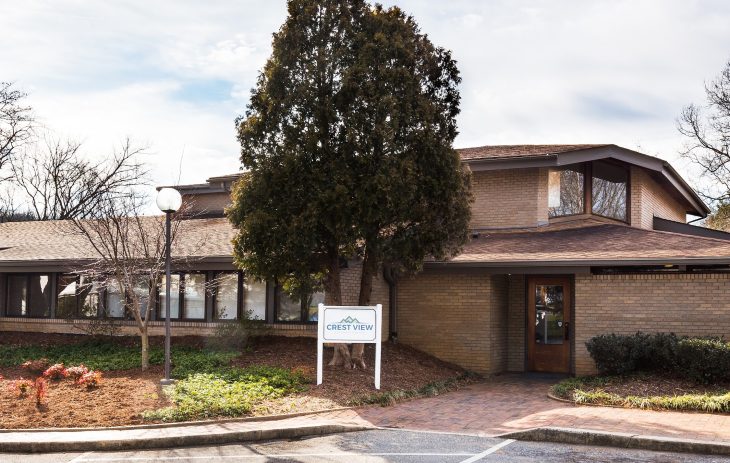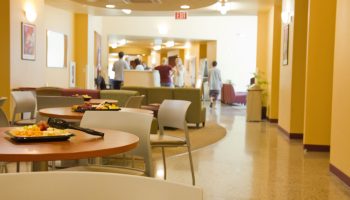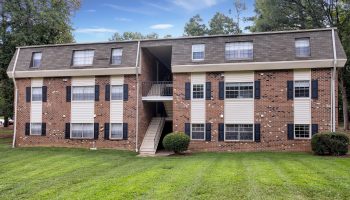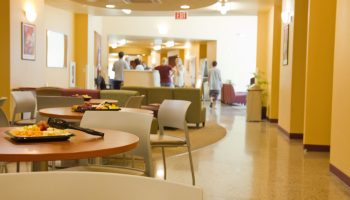About Crest View Recovery Center Asheville
Located in North Carolina is the Crestview Recovery Center in Asheville. This is a drug rehab and recovery facility that provides a continuum of services to men and women who are struggling with substance use. There are also specialized programs here for members of the LGBTQ community, veterans, and young adults.
There’s a rehab program that lasts 90 days along with various outpatient recovery programs. In these programs, you’ll work with a team that will apply a mix of evidence based practices and holistic approaches to care.
Medication assisted treatment (MAT) using Suboxone is available here to help you stabilize your body so that you can benefit from the therapy services here.
The holistic programs are well rounded and include everything from yoga and meditation to acupuncture, to art and music therapy. There’s also a strong focus on health and wellness and you’ll work on improving your life through experiential, wilderness, and recreational therapies. Ashton Park isn’t too far away if you just want to decompress and relax.
Coupling these therapies with their neurofeedback program and cognitive behavioral approach to care, you’ll reflect on current habits, learn about different strategies, and be equipped with the skills to make healthier life choices.
This facility is also pet friendly and allows you to bring along your furry friend. This will not only help ground you as you move through treatment, but it will give you a sense of home and comfort as you move through rehab.
The facility itself is modern with an apartment style feel that’s safe, supportive, and a strong launching pad for you to practice independent living. There are fully furnished rooms, comfortable community spaces, and shared bedrooms where you’ll begin the first leg of your recovery Journey.
Once you complete the program, Crest View will connect you to other services whether it be transitional living, aftercare support, or ongoing support through their alumni program.
Levels of Care
-
Inpatient
Inpatient and residential programs provide round-the-clock medical and emotional support as you live at the treatment facility. This level of care may be recommended if you have severe addictions or mental health conditions since it removes outside distractions and allows you to focus solely on therapy.
-
PHP
Partial hospitalization programs provide comprehensive treatment in a structured setting during the day but allow you to return home at night. These programs offer a balance of inpatient and outpatient rehab and provide intensive support without full time residency.
-
Outpatient
In outpatient therapy, you’ll attend therapy sessions several times each week while living at home. This is ideal if you have a strong support system and a lower risk of relapse. Outpatient treatment offers flexibility to maintain work, school or family obligations.
-
Aftercare
Aftercare programs provide ongoing support after you complete a rehab program. They may include several components to help you maintain sobriety including therapy, community support groups and relapse prevention strategies. This gives you a network of resources as you reintegrate into your daily life.
-
Dual Diagnosis
Dual diagnosis programs address substance use disorders and co-occurring mental health conditions simultaneously. This integrated approach to care improves the likelihood of long term recovery and stability by addressing the root causes of addiction.
-
Intervention
An intervention is a structured and professionally guided conversation with an individual who is struggling with addiction. During the conversation, family and friends will encourage you to seek treatment. This is often a pivotal step for those resistant to getting help.
Detox Service Setting
-
Inpatient Detox
Inpatient detox occurs in a dedicated treatment facility. You’ll live there around the clock and receive intensive medical support and supervision to help manage your withdrawal symptoms. It is suitable for individuals with moderate to severe addictions as it ensures a stable detox environment.
-
Outpatient Detox
Outpatient detox gives you access to medically supervised withdrawal services while still allowing you to live at home. You’ll attend a clinic for treatment and monitoring. This flexible option is suitable for those with mild to moderate withdrawal symptoms who have strong support systems.
-
MAT
Medication assisted treatment combines medication and counseling to manage withdrawal and reduce cravings for opioid and alcohol addiction. Medications may include methadone, buprenorphine or naltrexone. MAT is tailored to your needs so you can actively participate in your treatment journey.
Programs
-
Adult (18+)
Adult programs address the substance use and life challenges specific to adults. Therapists can deliver sessions in individual, group and family settings. Services often include job support and life skills training in a structured environment.
-
Alcohol Detox
Alcohol detox programs offer medical support to help individuals withdraw safely from alcohol. Your care team may use medications to ease your symptoms and provide medical monitoring to address complications.
-
Cognitive Behavioral Therapy
Cognitive behavioral therapy focuses on changing harmful thought patterns and behaviors associated with addiction. You’ll learn healthier coping mechanisms by identifying and replacing negative thoughts. This improves your emotional resilience and decreases your relapse potential.
-
Men
Men's programs address substance use while also considering the social pressures, family roles and mental health concerns that are specific to men. You’ll learn healthy coping mechanisms as you build emotional resilience and develop communication skills.
-
Opioid Detox
Opioid detox uses medications to ease severe withdrawal symptoms. It also includes medical supervision to help you manage potential complications. These services allow you to stabilize and begin a recovery plan.
-
Rational Behavior Therapy
Rational behavior therapy helps you identify irrational beliefs that contribute to an addiction. Challenging and modifying those beliefs helps you develop healthier attitudes and behaviors. This therapy supports long term sobriety and sustainable recovery.
-
Women
Women's programs offer a safe and supportive space to focus on gender specific issues such as trauma, family roles and mental health conditions. Therapists tailor the sessions to address women's needs and foster empowerment in a healing and nurturing environment.
-
Young Adult (18 - 25)
Young adult programs are designed for individuals who are transitioning into adulthood. Topics of discussion typically include identity, independence and peer relationships. Providers may also offer life skills training and career support.
Payment Options
- Private Insurance
- Self Pay
Accreditations
-
 LegitScript Certified
LegitScript Certified
-
 NAATP
NAATP
-
 SAMHSA
SAMHSA
-
 Joint Commission
Joint Commission
Amenities
- Acupuncture Room
- Private Rooms
- Yoga Studio
Contact
90 Asheland Avenue
Asheville, NC 28801





